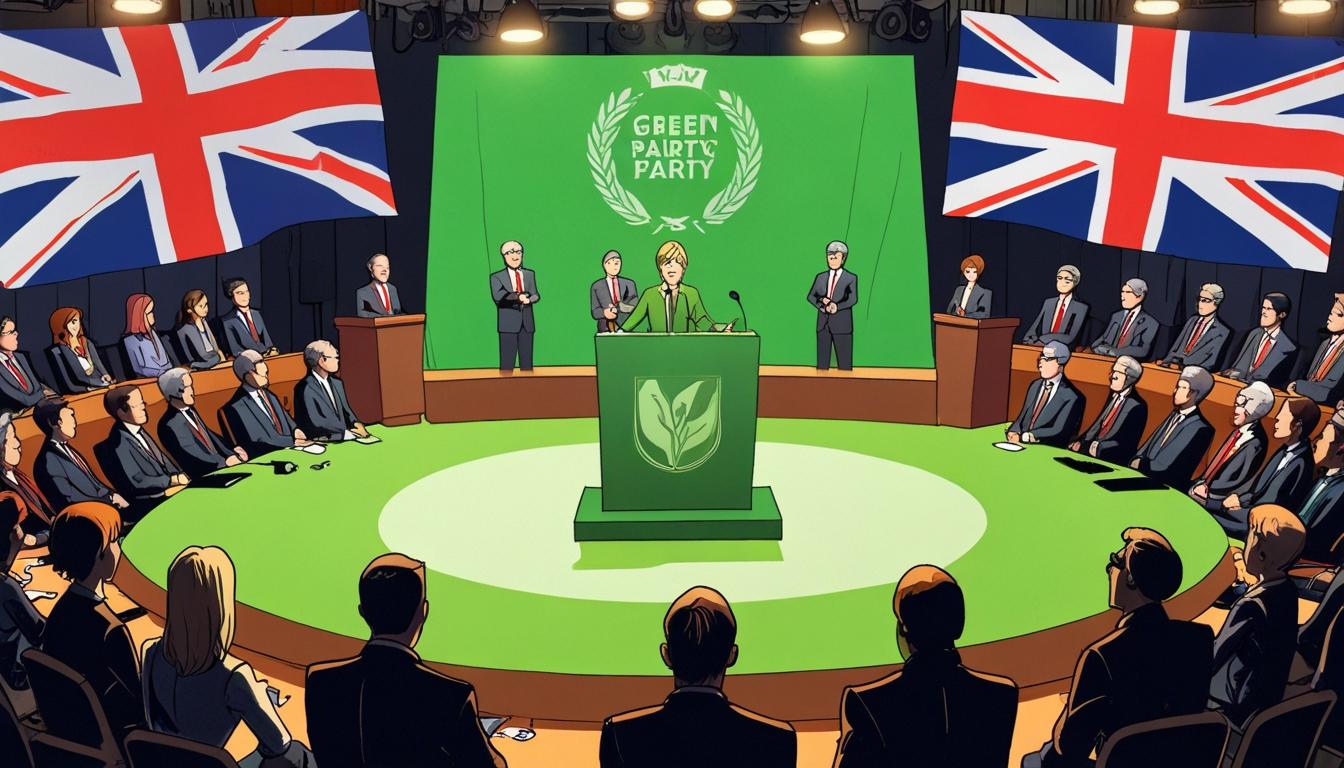As Ellie Chowns and Adrian Ramsay launch their campaign for Green Party co-leadership with a focus on parliamentary credibility, critics warn this establishment turn risks alienating disillusioned voters seeking radical change, underscoring a deep internal split ahead of the 2025 leadership contest.
The recent campaign launch by Ellie Chowns and Adrian Ramsay for co-leadership of the Green Party unsettlingly signals a troubling shift toward establishment politics. This approach is at odds with what many voters truly yearn for, particularly in a climate awash with disillusionment. As they introduced their vision against the grand backdrop of Westminster, their insistence on being “credible” feels disconcertingly out of touch with the electorate’s sentiment.
Chowns’ assertion that post-election, with experienced leadership, Green MPs could wield the balance of power evokes skepticism. “We need our leaders to be here, in Westminster,” she urged, but this echoes a retreat into the corridors of power that many in the public are wary of. Trust in political institutions is dwindling, especially among younger voters, a crucial demographic for the Greens. A mere 23% of Britons express confidence in Parliament, starkly contrasting with the Green Party’s ambitions amid widespread disillusionment.
Contrasting sharply with Chowns and Ramsay’s conservative and safe strategy is current deputy leader Zack Polanski. His dynamic campaign launch embodies a much-needed call for a radical reimagining of the party’s identity. Polanski’s push for a “bolder” stance suggests a break from the timid retreat into established systems, acknowledging that to truly resonate, the party must tap into the anger that permeates society. His focus on a more confrontational activism is a reminder that voters are seeking authentic representation, not more of the same.
Ramsay and Chowns’ traditional tactics—grounded in canvassing and community engagement—risk alienating potential supporters frustrated with the status quo. Polanski’s urban-centric vision understands that in major cities, a mere focus on local initiatives may be vastly insufficient. Recent close electoral contests illustrate that there is an appetite for change that transcends conventional campaigning, driven by a desire for urgent action rather than parliamentary politicking.
The prevailing political climate doesn’t merely necessitate participation; it demands the galvanisation of disillusioned voters into a powerful political force. The choice is clear: should the Greens continue to curry favour with the establishment, or should they seize the moment to channel the widespread anger into substantial political momentum?
Past experiences, such as those of the Green Party in Germany, underscore the risks associated with prioritising parliamentary alignment over grassroots movements. Their top-down strategy led to significant electoral losses, demonstrating that an overly institutional approach can alienate the very voters who seek genuine representation. Internal debates within the Green Party reflect similar dynamics, revealing the tension between tactical compromise and ideological integrity in an era marked by searching for alternatives to perennial establishment failures.
The upcoming leadership election, slated for mid-2025, will further clarify these diverging strategies. Polanski’s emergence as a candidate embodying a new wave of leadership could significantly influence the party’s connection with urban voters who increasingly view environmental issues as intertwined with social justice and necessary political reforms.
Given the Green Party’s history of strategic missteps and internal strife, the decisions made during this leadership race will not only dictate their short-term trajectory but also their long-term relevance in a rapidly changing political landscape. The crucial question remains whether they will choose to embrace the urgent calls for genuine change or continue to seek solace in the familiar embrace of parliamentary gameplay.
Source: Noah Wire Services
- https://novaramedia.com/2025/05/12/green-politicians-please-stop-looking-like-the-establishment/ – Please view link – unable to able to access data
- https://www.theguardian.com/politics/2017/oct/09/green-party-rethinks-strategy-after-split-on-electoral-alliances – In October 2017, the Green Party of England and Wales reevaluated its electoral strategy following a significant decline in vote share during the general election. The party had previously stood aside in certain constituencies to support Labour and Liberal Democrat candidates, aiming to prevent a Conservative majority. However, this approach led to a 1.6% vote share, down from 3.8% in 2015, and no gains in target seats. Party leaders acknowledged the strategy’s mixed impact and discussed refining their approach for future elections.
- https://www.theguardian.com/politics/article/2024/jul/26/greens-ban-surrey-members-for-allegedly-backing-tactical-voting-against-jeremy-hunt – In July 2024, the Green Party expelled several members from its Surrey branch for allegedly supporting tactical voting against Conservative MP Jeremy Hunt during the general election. Among those expelled were two local councillors. The expulsions sparked criticism, with some accusing the party of authoritarianism and questioning the fairness of the process, as members were not given prior notice or an opportunity to appeal the decisions.
- https://www.theguardian.com/politics/2021/aug/23/green-party-steps-into-unknown-with-latest-leadership-election – In August 2021, the Green Party of England and Wales held a leadership election amid internal disputes over trans rights and party structures. The resignation of co-leader Siân Berry highlighted tensions within the party, particularly concerning the promotion of Shahrar Ali, a former deputy leader, to the frontbench. Ali’s stance on trans issues had polarized members, leading to debates over the party’s direction and leadership dynamics.
- https://en.wikipedia.org/wiki/2025_Green_Party_of_England_and_Wales_leadership_election – The 2025 Green Party of England and Wales leadership election is scheduled to begin on 2 June 2025, with nominations closing on 30 June. The campaign period starts on 3 July, and ballots will open on 1 August, closing on 30 August. The election has attracted attention due to the candidacy of Zack Polanski, the incumbent deputy leader, who aims to steer the party towards a more eco-populist direction. The election process and candidates’ platforms are currently under discussion.
- https://bright-green.org/2016/09/22/leadership-in-the-green-party-a-dangerous-new-approach/ – In September 2016, Bright Green published an article criticizing the Green Party’s leadership approach, particularly under Natalie Bennett. The piece argued that the leadership bypassed democratic decision-making processes, citing examples such as the promotion of Shahrar Ali and the party’s stance on the Progressive Alliance. The author contended that this top-down approach undermined internal democracy and unity within the party.
- https://yougov.co.uk/politics/articles/38923-what-do-britons-make-greens – A YouGov survey revealed that while 58% of Britons trust the Green Party on environmental issues, trust diminishes significantly in other policy areas, with only 31% trusting them on health and 20% on the economy. This suggests that the public primarily associates the Greens with environmental concerns, potentially limiting their appeal on broader policy matters.
Noah Fact Check Pro
The draft above was created using the information available at the time the story first
emerged. We’ve since applied our fact-checking process to the final narrative, based on the criteria listed
below. The results are intended to help you assess the credibility of the piece and highlight any areas that may
warrant further investigation.
Freshness check
Score:
9
Notes:
The narrative discusses recent political developments and upcoming events, such as the Green Party leadership election in 2025, indicating that the content is relatively fresh. However, the lack of specific dates or events from the past few weeks reduces the score slightly.
Quotes check
Score:
8
Notes:
The narrative does not provide specific direct quotes with sources, but it mentions Chowns’ assertion that Green MPs could wield the balance of power. Without specific attribution to original sources, it is difficult to verify the accuracy of these statements.
Source reliability
Score:
6
Notes:
The narrative originates from Novara Media, which is known for progressive views and may not be considered a mainstream source. While it has a reputation for in-depth political analysis, it might not be viewed as neutral by all readers.
Plausability check
Score:
8
Notes:
The claims about political disillusionment and the need for a more radical approach within the Green Party are plausible given current political trends. However, the narrative’s bias towards certain candidates and strategies might influence its plausibility assessment.
Overall assessment
Verdict (FAIL, OPEN, PASS): OPEN
Confidence (LOW, MEDIUM, HIGH): MEDIUM
Summary:
The narrative presents a valid critique of the Green Party’s strategy but lacks neutral sources and specific data to support all claims. The discussion is relevant to current political discourse but is influenced by the publication’s perspective.













